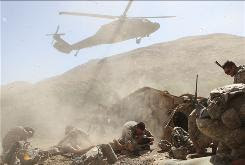
| By Nikola Solic, Reuters | |
| Pfc. Cory Terry helps Spc. Michael Keenan after an improvised explosive device damaged their vehicle Saturday in Afghanistan's Logar province. | |
Mullen has spoken out more in the last year about the risks of mild TBI caused by roadside bombs, often invoking a story of a young soldier who endured 30 blasts and is now suffering significant brain damage.
"I don't know what the right number is, but 30 is way too many. I'm literally on the verge of saying, you know, 'Hey, it's two or it's three (mild TBIs) and you're out,' " Mullen told an audience at Harvard University Medical School last month.
The military estimates the cost of Mullen's initiative — in troops removed from combat — may be minimal, with only about 1% to 2% of the 15,000 to 20,000 U.S. servicemembers in Afghanistan routinely exposed to roadside bombs sidelined during a period of several months, or about 150 to 400 people, says Army Col. Chris Macedonia, Mullen's medical science adviser.
Those troops would remain on forward operating bases performing other duties, even after any concussive symptoms go away, he says. The recommendations would also apply to Iraq, but the number of roadside bombings there have dropped dramatically in the past year.
"We have to remember we are fighting a kind of fight that is a multidimensional, long-term counterinsurgency — which means we have people going into rotations over and over again," Macedonia says. "We have to preserve those people for the follow-on fight."
Mullen's proposal stems, in part, from civilian research into football injuries showing the dangers of multiple mild TBIs, Macedonia says. The studies show that players with three or more concussions in one season are three times more likely to experience another mild TBI. They also begin to recover more slowly after suffering three concussions.
Marines initiated policy
Marines in Afghanistan started to pull troops out of combat in early 2008 based on a complex formula involving a history of multiple concussions during a tour, Macedonia says. The Marine Corps is revising and broadening the policy, says Capt. Brian Block, a Marine spokesman.
The Army is also crafting a new policy after Mullen sent a memo in June to the Army chief of staff, Gen. George Casey, urging Casey to look at the Marine Corps efforts, says Macedonia and Cynthia Vaughan, an Army spokeswoman. The Army provides more than 60% of U.S. forces in Afghanistan.
The new policy "may mean that after a certain number of (concussions), a servicemember will remain in the forward operating base for the duration of the deployment," says Brig. Gen. Richard Thomas, an assistant surgeon general for the Army.
Former football players who suffered multiple concussions were five times more likely to develop symptoms of a condition considered to be a precursor to Alzheimer's and three times more likely to become clinically depressed, says Kevin Guskiewicz, professor and director of the Center for the Study of Retired Athletes at the University of North Carolina-Chapel Hill.
Military scientists are still learning the full extent of brain damage caused by roadside bombs, even in cases in which soldiers or Marines may appear unscathed, says Air Force Col. Michael Jaffee, director of the Defense and Veterans Brain Injury Center, devoted to clinical care, research and education about TBI. In some cases, the damage could be more severe than concussions occurring on the football field, Jaffee says.
A RAND Corp. study early last year estimated that up to 300,000 servicemembers may have suffered a mild TBI in the Iraq and Afghanistan wars.
"He (Mullen) wants attention on this issue. That's what he's been pushing for," Macedonia says. "Despite the fact that we are applying principles based on the sports medicine literature, make no mistake about it, this is war and not a game. The stakes are a lot higher."
Not unlike Agent Orange
Macedonia led a team of military scientists sent by Mullen to Afghanistan in February to study the issue and the Marines' policy of pulling troops from combat after three mild TBIs.
Mullen compares the persistent mysteries surrounding blast-related brain injuries to diseases tied to Agent Orange, a defoliant used during the Vietnam War that was ultimately found to cause illnesses in troops.
"It's not an exact analogy," Mullen said during the Harvard Medical School speech. "But it's one that resonates with me because there's so much to learn (about long-term blast-related effects on the brain)."














